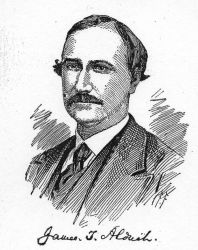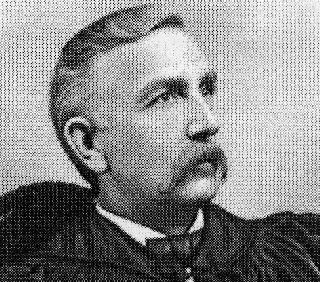| James Thomas Aldrich

(1819-1875)
South Carolina

The National Cyclopedia of Biography 128
(New York: James T. White & Co., 1904)(vol.12)
"ALDRICH, James Thomas, lawyer, orator and poet, was born in Charleston, S. C., Nov. 16, 1819, son of Robert and Ann Hawkins (Lebby) Aldrich and in the sixth generation from George Aldrich, who married Catharine Seald, and emigrated from Derbyshire, England, in 1631. Their son Jacob married Huldah Thayer; their son Moses married Hannah White; their son Luke married Anna French, and their son Esek, who married Amy Whipple, was the grandfather of James T. Aldrich. Robert Aldrich, his father, removed from Massachusetts to Charleston, S. C., where the son received his education. At the time he should have entered college circumstances compelled his going to work, and at the age of nineteen he was employed as an accountant on the construction of Fort Sumter. Later he studied law, and in 1842 was admitted to the bar, settling at Barnwell, S. C., where he practiced until his death, with the exception of the time he served in the Confederate army. During the latter part of the war he was assigned to department work at Columbia, S. C., with the rank of captain,
and frequently represented the Confederate government in legal matters. By the exercise of ability, industry and natural talent he soon went to the front rank of his profession, and many regarded him as one of the most eminent and distinguished
lawyers of his time. He appeared as counsel in nearly all the important litigation in his section of the state, but it was in the court of chancery that he acquired his greatest reputation. His usual style of oratory was argumentative, and he spoke in his ordinary conversational tone, but if aroused, he would often speak as though inspired; possessed of a wonderful magnetism, he was considered one of the most fluent and eloquent orators of his day. Upon literary occasions he wag freuquently the chief speaker, and as a dramatic, reader showed almost professional abilities. He was also popular as a lecturer. Giving full range to his kindly disposition and generous nature, he exercised an influence for good second to none of his contemporaries. He was a philanthropist in the broadest sense of the term, clients frequently having to wait while he served the oppressed and weak. Soon after the enfranchisement of the negroes he defended the first negro ever tried as a citizen in South Carolina or, it is believed, in the United States. He wrote many articles and poems. "A Legend of Niagara" (1856), "The May Queen" (1857), "Prayer" (1875) and others were greatly admired, but their author was as modest as he was brilliant, and never consented to the publication of his verse. His scholarly attainments, enhanced by his poetic nature, made him a master of debate and one of the most popular public speakers of his day. He was married on June 30, 1847, to Isabel C., daughter of Hon. Angus Patterson, at that time president of the South Carolina senate, and had four daughters and one son, James Aldrich, judge of the circuit court. He died at Barnwell, S. C., Sept,. 26, 1875." [The National Cyclopedia of Biography 138 (New York: James T. White & Co., 1904)(vol.12)][online text]
Bibliography
James Aldrich, A Short Sketch of the Lives of James Thomas Aldrich, esq. and his wife, Mrs. Isobel Coroneus Aldrich (with genealogical data)(Aiken, South Carolina: South Carolina Historical Society, 1903)

J.C. Hemphill, Men of Mark of South Carolina 14
(Washington, D.C., Men of Mark Publ. Co., 1907)(vol. 1) |

